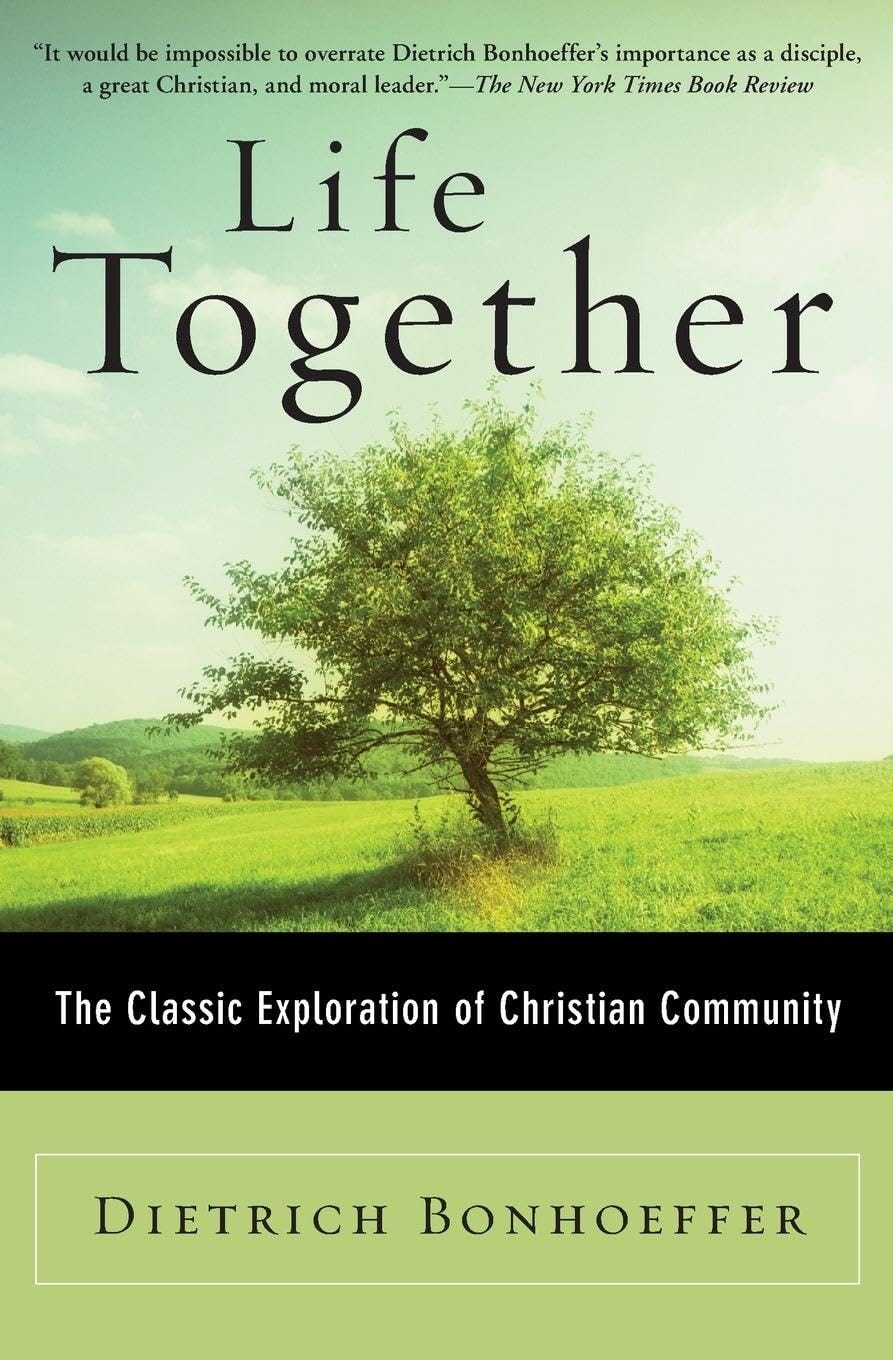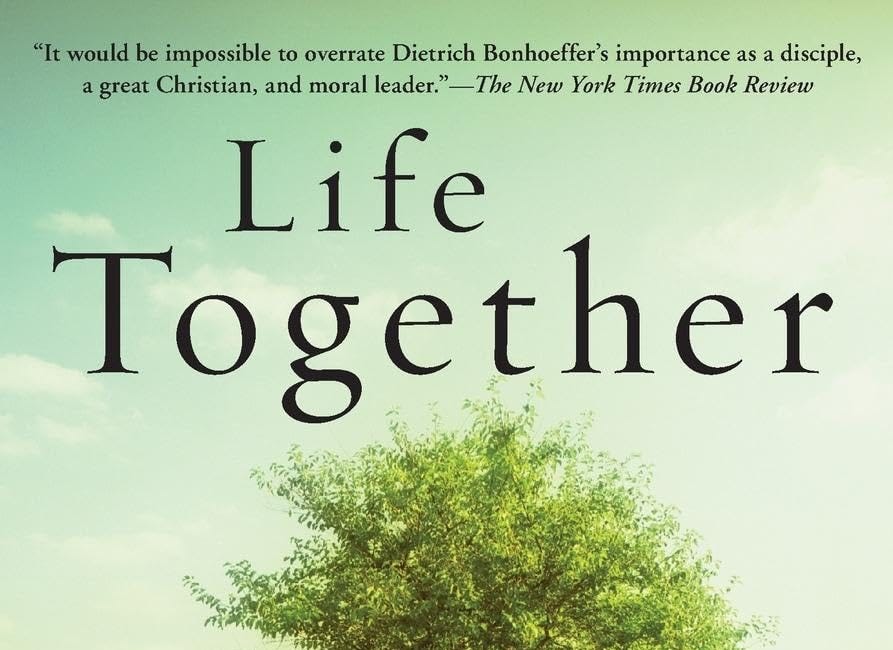Chapter 2 - The Day Together
Bonhoeffer points out that the Old Testament day began in the evening at sundown and in the New Testament the day begins in the morning with the sunrise.
The night is the time of expectation and the day is the time of fulfillment. Linking this to Jesus, Bonhoeffer writes, “The early morning belongs to the church of the Risen Christ.”
What do we, who today no longer have any fear or awe, of the darkness or night, know about the great joy that our forebears and the early Christians felt every morning at the return of the light?
There’s this beautiful idea about the silence of morning being broken by prayer and praise of the community. A sunrise service or in a monastic community, Lauds, or in a family, the morning devotional.
I wish always to greet the day with a song on my lips and a grateful heart. But I’m not a morning person, so I usually have to drag myself out of bed and gradually come alert to the world around me with the help of some coffee. Then my husband and I read the morning devotional.
Bonhoeffer cautions that “the beginning of the day should not be burdened and haunted by the various kinds of concerns” we face during the working day - the morning should be for God. The first word and the first thought for God alone.
The word of scripture, prayers and hymns should be included in your daily worship.
Praying the Psalms
Bonhoeffer is a great proponent of the Psalms and speaks of “praying the psalms” here. He wrote a wonderful little book called Psalms: The Prayer Book of the Bible where he advocates for the restoration of the rightful place of Psalms in worship. He reminds us that the Psalms are the prayers of human beings and we can find kinship in the ideas expressed there - we can use these prayers as our own.
The Psalter is the prayer book of Jesus Christ in the truest sense of the word.
He prayed the Psalter and now it has become his prayer for all time.
We may be offended by some of the psalms and have difficulty saying the words in the first person and when that happens we are to realize that the prayer is not our own but that of someone else, another member of the Body of Christ. The Psalms are the prayers of the congregation of God and belong in the mouth of the community in worship. They are the ultimate Prayers of the People.
Bonhoeffer waxes eloquent as he warms to this topic:
The body of Christ is praying, and I as an individual recognize that my prayer is only a tiny fraction of the whole prayer of the church. I learn to join the body of Christ in its prayer.
Intercessory prayer in this way teaches a person to pray selflessly. I find intercessory prayer to be indispensable in defeating the ego.
Scripture reading
Bonhoeffer then turns his attention to the daily reading of scripture. He cautions against using brief passages.
…brief passages must not take the place of reading the Scripture as a whole. The verse for the day is not yet the Holy Scriptures that will remain throughout all time until the Day of Judgement.
He seems to be saying that we need to see the Bible as a WHOLE word and not overly focus on one little part of it. I think this is helpful when trying to puzzle out what a particular passage may mean. A sentence can be taken out of context and manipulated to mean any number of things, but we need to understand the overall themes of the Bible and make sure our interpretation remains consistent with the whole picture.
He advocates a chapter of the Old Testament and at least one-half chapter of the New Testament every morning and evening. This sounds like a lot, and honestly I probably only did that one time in my life when I read the entire Bible in a year. I’m probably guilty of being too myopic when it comes to the Scriptures, picking apart passages trying to tease out their meaning, getting too interested in what ONE WORD means! But I do know that spending at least some time every day reading and studying the Bible has increased my general knowledge.
Bonhoeffer has some harsh words for those who would protest that this is too much.
If it is really true that it is hard for us, as adult Christians, to comprehend a chapter of the Old Testament in its context, then that can only fill us with profound shame.
We need constant renewal of the Word in our heads and in our hearts. The Scriptures are complicated and there is much we do not understand. But the answer is not to turn away and never read them, the answer is to engage them more and continue to ask our questions even if they are never answered.
Bonhoeffer argues that “The Scripture is a complex unity, and every word, every sentence, contains such a diversity of relationships to the whole that it is impossible always to keep track of the whole when listening to an individual portion of it.”
You might consider that as you plan your scripture reading. Instead of jumping around, he advocates a consecutive reading of each book of the Bible so that you can understand the context better.
He also thinks it appropriate to lose yourself in the narrative, be one with Israel as they pass through the Red Sea and cross the desert and finally the Jordan into the Promised Land. Walk with Jesus in Galilee, take your vigil at the foot of the cross and experience his resurrection first hand. In this way, “We are uprooted from our own existence and are taken back to the holy history of God on earth.”
God comes to us in this reading and in this way we place God’s actions in history above what we wish for God to accomplish for us today. It is a practice of diminishment, a realignment of our priorities.
I find salvation not in my life story, but only in the story of Jesus Christ.
I find this writing inspiring and moving. For me what he says carries weight because of the way he lived his life. I only hope I can follow this example.
Singing Together
We sing together so that we can all “speak and pray the same Word at the same time - in other words, for the sake of uniting the Word.”
Bonhoeffer has some STRONG opinions on congregational singing, advocating “unison singing - untouched by the unrelated motives of musical excess!”
I thought this quote was funny:
There are the bass or the alto voices that must call everybody’s attention to their astonishing range and therefore sing every hymn an octave lower. There is the solo voice that drowns out everything else, bellowing and quavering at the top of its lungs, reveling in the glory of its own fine organ. There are the less dangerous foes of congregational singing, the “unmusical” who cannot sing, of whom there are far fewer than we are led to believe. Finally, there are often those who will not join in the singing because they are particularly moody or nursing hurt feelings; and thus they disturb the community.
He claims that congregational singing is a spiritual matter.
It is the voice of the church that is heard in singing together.
It is not I who sing, but the church.
Our prayers
Bonhoeffer advocates for one person to pray extemporaneously at the close of the daily worship, usually the head of the household. This is a prayer of intercession, a prayer for the whole community.
I must admit I am not good with extemporaneous prayer and usually write down the prayers I use in worship, but Bonhoeffer makes a good point about this:
By using ecclesial forms and the church’s wealth of thought, we can easily deceive ourselves about our own prayer life. The prayers then become beautiful and profound, but not genuine.
He does admit that the prayers for public worship differ from those in the community living together, nonetheless I am convicted.
He then says a few words about breaking bread together and then says that after the first hour until evening the Christian should be about their work. In the evening the community will break bread together again and then sleep.
There was a lot of wisdom in this chapter for me to ponder even though I don’t live in a monastic community or conduct a morning worship with my household. I particularly liked the idea of starting the day with God - firstfruits and all that - setting your focus. Let me know what resonated with you.
Some more cool quotes:
All the darkness and confusion of the night with its dreams gives way to the clear light of Jesus Christ and his awakening.
The more we sing, the more joy we will derive from it.
Through the cross of Jesus these psalms have been granted to his body on earth as prayers that issue from his heart.
The fact that Jesus Christ died is more important than the fact that I will die.
We must once again get to know the Scriptures as the reformers and our forebears knew them. We must not shy away from the work and the time required for this task.
The heart sings because it is filled with Christ.





